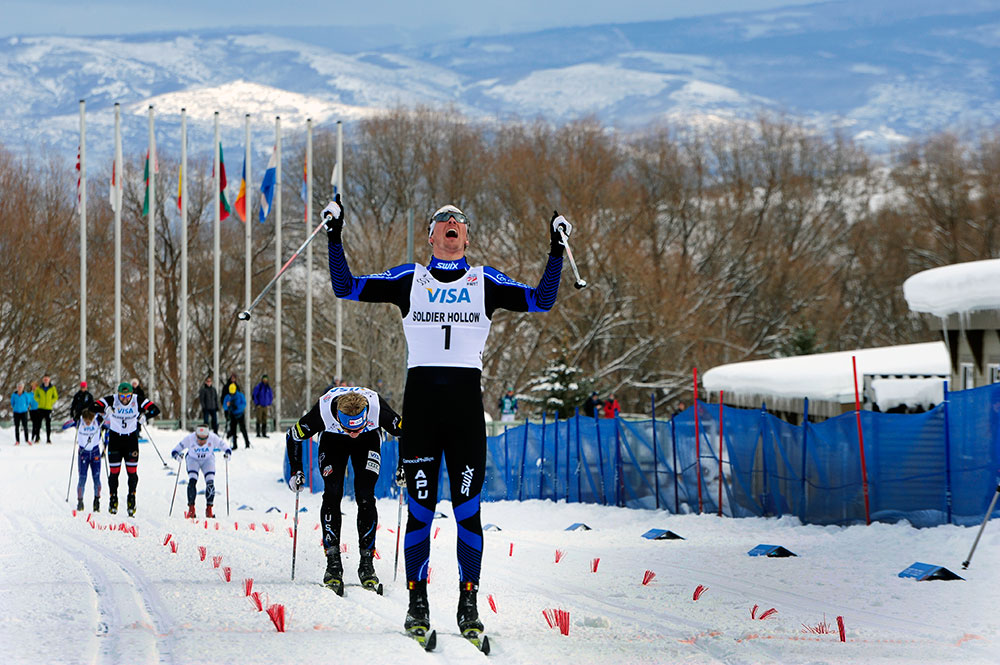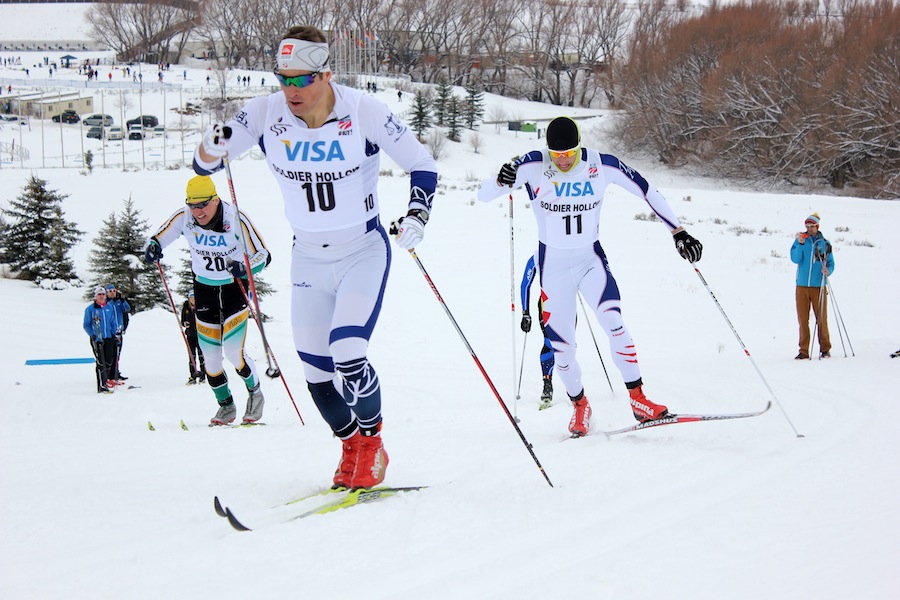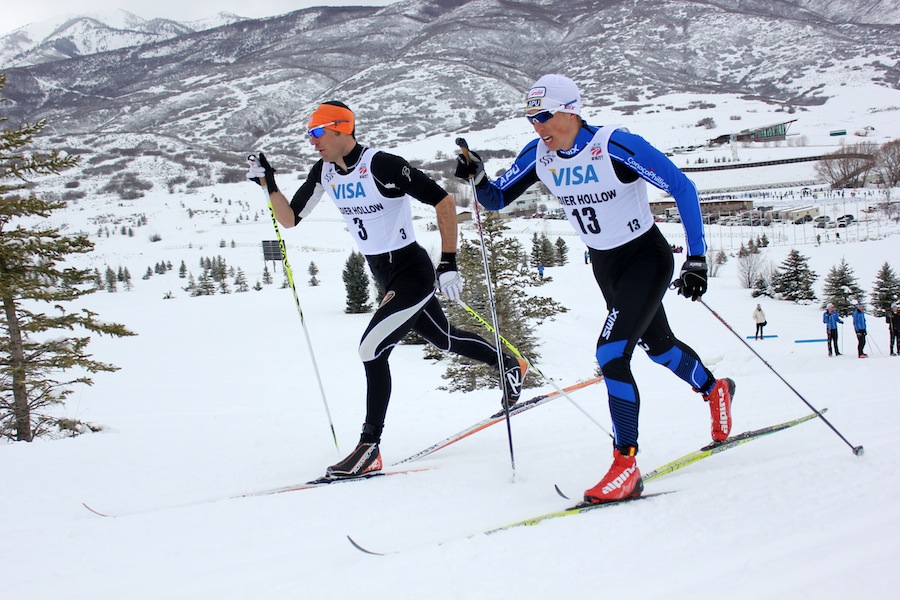
MIDWAY, Utah – Bronze, silver, and now gold. Reese Hanneman of Alaska Pacific University has captured them all after his win in the 1.6 k classic sprint on the final day of the 2014 U.S. Cross Country Championships. En route to his first national championship, Hanneman made winning look easy despite competing against the best sprinters in the country.
In an A-final that included 2010 and 2012 national champion Tyler Kornfield and a surprisingly strong Kris Freeman, Hanneman was able to outsprint second place finisher Erik Bjornsen of Alaska Pacific University (APU) and the U.S. Ski Team, and Dakota Blackhorse-von Jess of the Bend Endurance Academy who crossed the line in third.
“You can’t beat it. Those are the days you suffer all year for. I still don’t believe it,” the 24-year-old Hanneman said in an interview.

Hanneman, who claimed second in the 15 k classic and third in the skate sprint earlier in the week, used his momentum and confidence to end nationals with a bang. On Friday, it all started with skiing to an impressive qualification win, 2.6 seconds over teammate and second place finisher Bjornsen.
From that point on, Hanneman was in a class of his own, and no one could touch him all day.
But how did he do it? He knew he had the fitness and he knew he had the speed. All he needed to do was execute a plan that would shoot him to the top of the podium.
For the Fairbanks native, such a plan was simple: build a lead that no one could overcome.
“I knew that if I just pinned it right from the gun that not too many of those guys could hang with me and I could stretch it out before we got to the sprint.”
It also helped that course was incredibly difficult, featuring the entirety of Hermod’s Hill. “I felt really good striding. That course was difficult, with huge hills. I just tried to make it hurt like I’ve never hurt before,” he said.
Bjornsen couldn’t have agreed more and said that Friday’s race was all about making it hurt. Whereas many other sprint courses require more calculated maneuvers, Fridays course required grit.
“It didn’t seem like there were a lot of tactics; the tactic was to go hard,” he said.
In each round of the finals, Hanneman led out of the gate and increased his lead throughout the 1.6 k course. In both the quarterfinals and the semifinals, he skied by himself for the majority of the roughly four-minute race.

The only challenge that Hanneman faced came from his teammate, Bjornsen, who attempted to stay with him up and over Hermod’s. Three-fourths of the way up the climb, Bjornsen jumped in the tracks behind Hanneman, hoping to catch a draft on the downhill and a boost into the finish. However, it didn’t pan out.
“I slipped three or four times [at the top of Hermod’s] because I was tired and he put ten feet on me and it was over from there,” Bjornsen said.
When asked whether or not he thought he had a chance of catching Hanneman before the finish, Bjornsen said that, because of amount of time the two APU skiers had spent training together, he knew that once his teammate obtained the lead there was no reigning him in. “I was trying, but I was pretty sure it wasn’t going to happen,” he said.
Hanneman wasn’t as confident that he had a secure lead, and confessed that he checked behind him to see if Bjornsen was coming, a risky move in a sprint race.
“Most people never admit that they look back, but I definitely did look back,” he said with a laugh. ”I wanted to make sure I could make it all the way to the line.”
Hanneman saw what the rest of the field already knew. Bjornsen was far from striking distance, and he had won his first national title.
Back in third, Blackhorse-von Jess did his best to maintain his position in the hope that the pair of APU skiers would eventually slow. “Erik and Reese were on fire and they pulled away right out of the gates and they stayed there,” he said. “There were a couple times where I could have burned everything and just chased them down, but I skied in the hope that one of them [would get] tired. But they did not get tired.”

It turns out that Blackhorse-von Jess should have been more worried about who was coming up from behind. Freeman (Maine Winter Sports Center), who is known for his distance skiing, made a late surge up the last corner and into the stadium.
After loosing speed on the very same hill, Blackhorse-von Jess realized his position in third was in jeopardy.
“I decided I wasn’t going to lose the race,” he said “I double polled as hard as I could, which was the first time all day that I got to go as hard as I could.”
Blackhorse Von-Jess, who describes double poling as his “bread and butter” pulled away from Freeman, making it seem as if his place on the podium was never at risk.
Rounding out the the A-final was Freeman in fourth, Mikey Sinnott (Sun Valley Ski Education Foundation) in fifth, and Tyler Kornfield (APU) in sixth.
Olympic Implications
Looking back at the results from the 2014 U.S. Cross Country Championships it is very apparent that there were some who excelled and others who did not. Hanneman turned out to be the shining star of the week, standing upon the podium in every event he raced in.
It wasn’t a fluke either. Hanneman had chosen to concentrate on nationals as early as last spring.
“I especially picked this week to focus on so it is just amazing to have it come together,” he said. “I really focused on everything I could do to nail it this week.”
While it seems obvious that American skiers would focus on doing well in the national championships, in an Olympic year such as this, the races at Soldier Hollow were even more important for domestic racers. While the 2014 nationals were not Olympic trials, they served as a venue where the nations best could gather and demonstrate their abilities in the hopes that they could be one of the few who wasn’t already racing in Europe to make the team.
When asked about the Olympic implications of his stellar week at Soldier Hollow, Hanneman said he had no idea what his results meant. “The whole process is pretty vague. There are a lot of athletes, hopefully like myself, who are in the running and all we can do is try to do our best.”
As he looks forward, he’s decided not to worry about whether or not he will be picked for the team. “There are so many details I’m not aware of and so I try to ski as fast as I can. If it’s meant to happen it will fall into place. I’ve done all I can do.”

For three-time Olympian Freeman, this week was all about FIS points. In order to place second behind Noah Hoffman in the American FIS distance rankings he needed to place in the top three in both of the distance races. He barely did so, placing third in both.
“I am very confident that with a little downtime at home that my best Olympic results are in front of me,” he wrote in his blog.
Bjornsen, whose sister Sadie has already made the qualification criteria for a spot on the Olympic team, plans to head to the World Cup in Poland before racing at the U23 World Championships in late January in Val di Fiemme, Italy. Whether or not the Olympics are part of that plan remains to be seen, but with a win in the 15 k classic and a second-place finish in the classic sprint, his chances are likely to be better than most.
Sylvan Ellefson (SSCV/Team Homegrown), who didn’t race in the classic sprint, has a fighting chance as well due to his international racing experience and national championship in Wednesday’s 30 k mass start.
“Whether they pick me for the Olympics this year or not, I’m just happy to have a national championship under my belt,” he said. “It’s literally the only thing I’ve ever wanted in my skiing career.”

Bryan Gregg (Team Gregg/Madshus), who finished second in Wednesday’s 30 k mass start and until Hanneman’s win was the U.S. SuperTour points leader, is currently racing in the World Cup races in the Czech Republic with his wife Caitlin. After having his best-ever week at a U.S. nationals, one can only assume that his hope is to do well in the next period of World Cup racing in order to impress the U.S. Ski Team.
For Blackhorse-von Jess, the Olympics are a waiting game. “We wait for the phone to ring … or not,” he said. “I don’t know what the point standings are and I don’t know how they’re going to pick the Olympic team. I have a hard time believing that today’s (Friday’s classic sprint) results have a whole lot of impact on the Olympic selection. But then again I have no idea.“
Despite his third-place finish in the classic sprint, he was slightly disappointed. He said that he had felt amazing in Sunday’s freestyle sprint, but unfortunately fell in his semifinal. Despite his seventh place finish, he hoped the national-team coaches would look at that result over the Friday’s classic sprint.
In the end, Olympic speculation is just a guessing game that has no concrete answers. To get those answers, the American cross country community will have to wait until the 21-22 of Jan., when the U.S. Ski Team will make its final announcement.
“Everybody speculates because it’s fun to do. It’s less fun when you’re involved and your name is in the ring.”
Lander Karath
Lander Karath is FasterSkier's Associate Editor from Bozeman, Montana and a Bridger Ski Foundation alumnus. Between his studies at Middlebury College in Vermont, he is an outdoor enthusiast and a political junkie.



